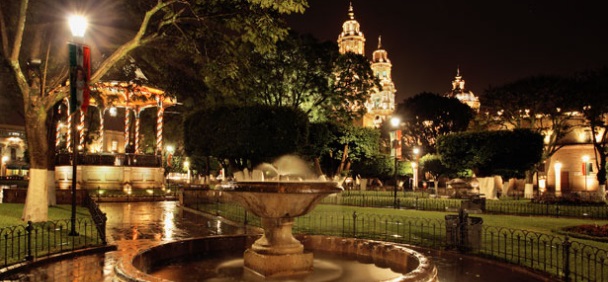Teach English in Morelia
History
Built in the 16th century, the UNESCO World Heritage site that is in the city of Morelia is an outstanding example of urban planning that combines the Spanish Renaissance with Mesoamerica.
Well-adapted to the slopes of the hill site, Morelia’s streets still follow their original layout. More than 200 historic buildings, all in the region’s characteristic pink stone, reflect the town’s architectural history, revealing a masterly and eclectic blend of the medieval spirit with Renaissance, Baroque and neoclassical elements.
Morelia was the birthplace of several important personalities of independent Mexico and has played a major role in the country’s history. The city’s three-quarter of a million inhabitants project an almost tangible civic pride as they go about their daily business in the beautifully preserved rose-tinted colonial city centre.
This is the capital of the state of Michoacán, which has so much to offer visitors it could be a country in its own right. But other than language students (there are a number of good schools offering Spanish courses here), few foreign tourists seem to make it to Morelia which leaves those that do free to explore the city’s many attractions without the crowds and to use it as a base for visiting the surrounding towns and villages.
Culture
Many tourists visit Michoacán for Day of the Dead celebrations, such as this one on Island Pacanda. Michoacán is known for its rich and varied culture, most notably for its unique pre-columbian and colonial architecture as well as its art and cuisine.
The P’urhépecha were skilled weavers and became known for their feathered mosaics made from hummingbird plumage and precious stones. With time, these gifted people also became skilled craftsmen in metalworking, pottery, and lapidary work. In the Michoacán of this pre-Hispanic period gold, copper, salt, obsidian, cacao, cotton,cinnabar, seashells, fine feathers, wax and honey were abundant and quickly became highly prized products to the Spaniards.
Modern day, there are many cultural activities in Michoacán, especially in the major cities like Morelia, Patzcuaro, and Uruapan. Morelia, as the capital, has the highest number of museums, art galleries, film theaters and restaurants. Every year in the month of October Morelia hosts an international film festival, which is rapidly growing to become one of the top festivals in the whole country and which features international film stars such as Gael Garcia, Diego Luna and Martha Higareda.
Economy
A state with abundant natural resources, Michoacan is one of Mexico’s main producers of agricultural products. Mining is also a leading industry in the state, with significant production of gold, silver, zinc, and iron. Steel industry production is the largest in the country. Lazaro Cardenas port is a large and important one for containers. Other important economical activities in Michoacán include the energy industries, as well as tourism and art gatherings like expositions, ancient and contemporary theatrical shows and film festivals.
Cost of living
Based on a U.S. dollar exchange rate of $17.10 pesos the cost of living in Morelia varies from US$350 to US$600 on a month by month basis. These figures are based on expenditure on housing, food, education, transportation, clothing, recreation, health, furniture, appliances and personal use.
Monthly rentals in the city are low at just US$140.
A big feature of living in Mexico is that domestic help is relatively cheap compared to countries in the Western world. In Morelia it’s common to pay around US$25 to a person (usually a woman) who will come and clean your apartment, iron clothes and if you’re willing to pay a bit extra, cook as well.
For expatriates often the most important starting references upon arriving in a foreign country are expatriate clubs and associations. Some of the most important are the American Society along with the DAR, the International Friendship Club, and Rotary International. American Society acts as a large umbrella organization harboring smaller clubs and associations that are based on particular fields of interest.










